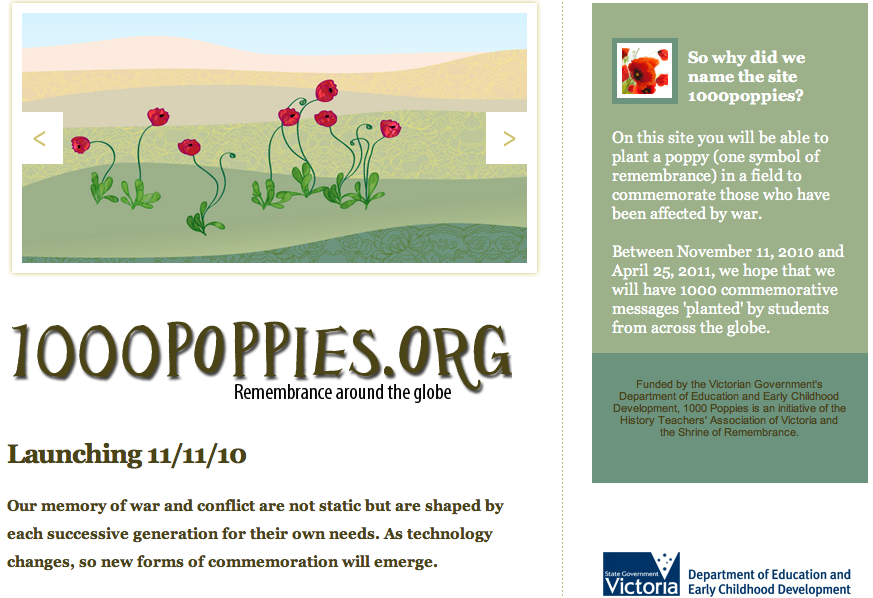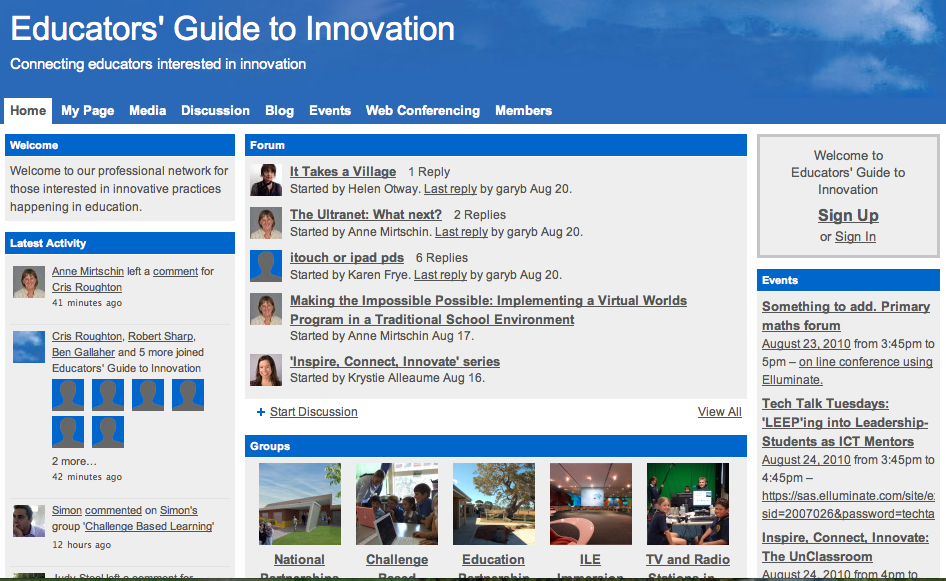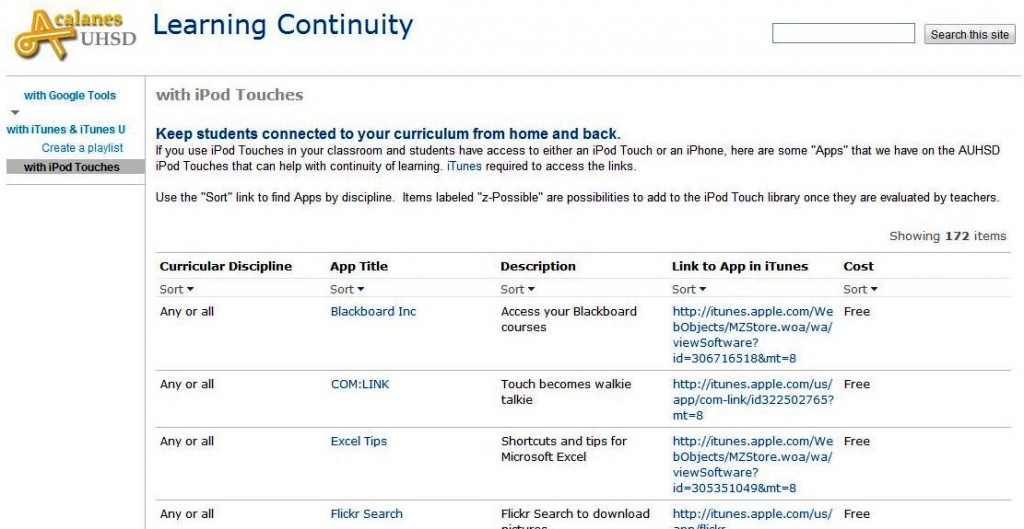The following information comes from the Victorian Virtual Conference Centre. Any educator from anywhere is welcome to join these sessions free of charge without the need for an Elluminate licence. A reminder that the session links are inactive until the date and time of the session.
“To start off Term 3 with a bang, why not bring your students to the Virtual Conference Centre for a virtual excursion to the zoo? We also have a range of PD opportunities on topics including ICT, maths and student engagement:
* Something to add – Primary maths PD series
* Act 4 Nature with Zoos Victoria (Student Session – join in
with your class!)
* Tech-Talk Tuesday: Teaching and learning without a classroom
* Tuning into your students
* Artists in Schools Program – Information session
* Hitchhiker’s Guide to the Ultranet – Episode 3: The return of the teachers
These sessions are free and you can participate from anywhere with an internet connection. Summaries of these sessions are below. Details of these sessions and more upcoming events can be found at:
http://guidetoinnovation.ning.com/events
Something to add – Primary maths PD series
WHEN: Monday, July 12, 2010, 3:45 – 5pm
PRESENTER(S): Andy Payne
SUMMARY: Looking for interesting ideas in teaching primary maths? Looking for resources to support your teaching? Come and share your triumphs, successes and failures with like-minded colleagues. New to web conferencing? No problem! Sessions will be paced at a level to help you pick up the necessary skills. Plus you can go back and look at the sessions again to review the bits you missed. Sessions begin with general information sharing and move on to a specific topic. You can suggest topics for future sessions.
SESSION LINK:
https://sas.elluminate.com/d.jnlp?sid=2007026&password=somethingtoadd
Act4Nature with Zoos Victoria
WHEN: Tuesday, July 13, 2010, 2 – 3pm
PRESENTER(S): Rick Hammond and Donna Livermore, Zoos Victoria
SUMMARY: Chat to Zoo experts each month and take the pledge to Act4Nature www.act4nature.org.au. 2010 is the International Year of Biodiversity and we’re asking schools to get involved. Each month we’ll be profiling a different animal species that is under threat and recommending a simple action we can all do to help. Our animal ambassador for July is the wombat. The wombat is a tough customer who can usually fend for itself in the wild, but loss of habitat is one potential threat to this much-loved Australian marsupial. Find out what
you can do to help!
SESSION LINK:
https://sas.elluminate.com/d.jnlp?sid=2007026&password=act4nature
Tech-talk Tuesdays: Teaching and learning without a classroom!
WHEN: Tuesday, July 13, 2010, 3:45 – 4:45pm
PRESENTER(S): Andrew Douch
SUMMARY: In this presentation, Andrew will explain how he has successively removed teaching & learning activities from the classroom and replaced them with online equivalents that are equally (or more) effective. His journey started in 2006 with a biology podcast (which is now receiving 1000 downloads a day) through which he explains the concepts that were previously only explained in class. Now he teaches biology to a class who does not even have a place in the school timetable! He will share the tools he has used and/or is using, including podcasting, screencasting, instant messaging, various websites/social networks and Elluminate. Some of his students will (hopefully) also attend to give a student perspective.
About Andrew: Andrew Douch is a practicing teacher of 20 years, and is currently the ICT Innovations Leader at Wanganui Park Secondary College, in Victoria, Australia. He has won a number of awards in recent years for his work with emerging technologies in education, including an Australian Government Highly Commended Award for Quality Schooling, the Victorian Education Excellence Award for Curriculum Innovation and the Microsoft Worldwide Innovative Teacher of the Year. Andrew is in demand as a keynote speaker, locally and internationally and is sought as a consultant by schools and the Education Departments on the use of online tools in schools. He is also in demand to provide professional learning workshops in schools – showing teachers how they can use freely available tools to transform their classrooms into learning communities, which not only engage Generation Y students, but lead to significantly improved learning outcomes.
SESSION LINK:
https://sas.elluminate.com/d.jnlp?sid=2007026&password=techtalktuesdays
Tuning into your students
WHEN: Wednesday, July 14, 2010, 3:45 – 5pm
PRESENTER(S): David Tapp
SUMMARY: If you want to improve or increase your student engagement then this series is designed for you. There will be a series of discussions regarding different student engagement strategies. From the use of technology for radio and television broadcasting through to working on gardening projects. Come and share your own ideas and systems for how to improve student engagement.
SESSION LINK:
https://sas.elluminate.com/d.jnlp?sid=2007026&password=tuningintoyourstudents
Artists in Schools program – Information session
WHEN: Wednesday, July 14, 2010, 4 – 5pm
PRESENTER(S): Arts Victoria
SUMMARY: The Artists in Schools program creates the opportunity for practising professional artists to work with young people in Victorian primary and secondary schools. It involves school communities in creative partnership projects while providing students, teachers and artists with diverse and challenging learning experiences. The program generates innovative ways to engage students across all strands of the curriculum, Prep to Year 10. Artists may work in any art form. The program provides funding of $6,500 for professional practising artists to work in a Victorian school for up to 20 days. This session for teachers and artists will give participants an opportunity to find out about the program and see outcomes from previous projects as well as
how to apply for funding. The session will be delivered by Artists in Schools program staff. Artists and teachers interested in the Artists in Schools funding program are invited to attend to see outcomes of previous projects and find out how to get involved and apply for funding.
SESSION LINK:
https://sas.elluminate.com/m.jnlp?password=M.825351FD5804095BA49BCFA6AA0
772&sid=2007026
Hitchhiker’s guide to the Ultranet: Episode 3, the return of the teachers
WHEN: Thursday, July 15, 2010, 4 – 5pm
PRESENTER(S): Becky Marley
SUMMARY: The third installment in our Hitchhiker’s Guide, this episode focuses on the ways teachers can start to incorporate the Ultranet into their classroom routine. As with all technology it is very important that the Ultranet should be able to be a new way of doing things we already do, not something ‘extra’ in our already jam-packed schedules. An open forum for teachers already building spaces for their students, and for those teachers wanting to know how to get started. Come along with us as we make the jump to Light Speed and explore the outer realms of Web 2.0 through the Ultranet.
SESSION LINK:
https://sas.elluminate.com/d.jnlp?sid=2007026&password=hitchhikersguide
HOW TO JOIN A WEB CONFERENCE SESSION:
1. You do not need to sign up. You may enter the conference using the session link provided.
2. Enter the web conference by clicking on the session link up to 30 minutes before it is scheduled to begin.
3. When prompted, enter your full name (eg. John Smith) and press ‘Login’. Elluminate will load and connect you to the session.
IMPORTANT NOTES:
– Ensure that you have tested the software at least 2 days prior to your session so that any technical issues can be resolved in time for the conference. Follow the steps at the ‘Getting Started’ webpage:
http://www.education.vic.gov.au/researchinnovation/virtualconferencecentre/use/start.htm
– If you have trouble connecting to Elluminate in your setup, your issue is likely to be solved by following the tutorials on the support page at:
http://www.education.vic.gov.au/researchinnovation/virtualconferencecentre/support.htm
– Please note that this session will be recorded and the recording may be published online. By entering this session you and any other participants with you are consenting to the recording and its distribution.”
It looks like there are plenty of excellent sessions to select from! Thanks to the Victorian DEECD Virtual Conference Centre for such a great initiative.



